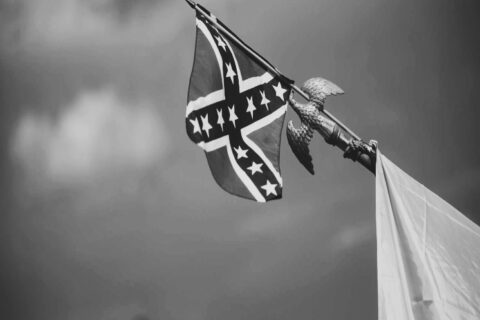Individualism and collectivism are often used as a false dichotomy. Individualists often state that you are either an individualist or a collectivist.
One such example of that dichotomy is this graphic that I often see scattered around:

Not only is the modern individualist argument a false binary, but it is also a false premise by not understanding of what an individual is. An individual is intrinsically part of their biological nation; whether or not they desire that is irrelevant. A man proclaiming himself as a fully independent, non-connected individual is no different from a man proclaiming he is a woman. It is imaginary and, in their mind, only.
We are all communitarian individuals. It is an inherent part of the human condition and our biology.
Both individualism and collectivism philosophies are dangerous. Collectivism, obviously so, because of its focus on the state (a political power or system, not the people). But so too is individualism, because of its degeneration.
The organic, unaltered form of individualism is not necessarily bad. Some of its original roots were laid as early as the Greco-Roman era (to a much lesser extent than of today, as they all still recognized communities).
Modern individualism, mostly since the Enlightenment, has gone completely wacky. They have shifted from the focus of individuals through their chosen local community to absolute individualism, as espoused by thinkers like Ayn Rand.
In effect, historic individualism changed from “me and my community” to modern individualism: “me, myself, and I.” They turn away from not only their nation, but even their community in the process.
This is something the Greeks and Romans could not have possibly fathomed. They were Roman first. They were Athenian, or Spartan. Read their works, you can feel their community identity bleed through the pages.
Marcus Aurelius, for instance, always put “Roman” before “man” in all of his writings. Including famously in this quote:
“Let it be thy earnest and incessant care as a Roman and a man to perform whatsoever it is that thou art about, with true and unfeigned gravity, natural affection, freedom and justice.”
Our ancestors claimed community and nation first, individual second. But both still mattered. It was not a false dichotomy between the two.
Who does this still today? Who claims their nation? Hardly any, if we are being truthful to ourselves. It’s all “me, me, and me.”
But even this mere thought is asinine, because everything we do, and use requires others. There are hardly any who are truly self-sufficient entirely on themselves, and even those that think they are still must use the security and stabilization of the state or other apparatus to not need to recruit their own army to protect their goods. That’s just one example; I am sure my reader can ponder plenty more.
Those same ancestors knew that when their people did well, they also did well. They relied on their nation, and in return their nation allowed them the liberties and individual options to prosper alongside them. Our heritage knew that it required more than one person to achieve such heights.
Their communitarian approach allowed a branching out of individualism, so long as its roots were in the community. People could be individuals because their nation was secure enough together.
To be alone is to be abandoned. The wild thing about modernity is that it convinces people to self-abandon and seclude themselves. That used to be implemented as a punishment. In fact, it was one of the worst punishments to be exiled from your community/nation. There are many famous cases of individuals punished with exile that instead chose to kill themselves, because of how severe it was perceived.
Now, because of degenerative individualism, being exiled is self-inflicted.
Which, in many ways, is exactly what the Enlightenment wanted. They wanted to distance themselves from the communitarianism (and the occasional error of collectivism) in Christendom. So, they did so by encouraging individualism, which provoked turning one’s back on their own nation.
This allowed other nations to operate more effectively, because they stayed united, versus others, which were segmented by each individual. This segmentation – being alone – leads to pathological cowardice, the final stage of degenerative individualism.
It also allowed the importation of excessive tolerance of every form of degeneracy and a firestorm of greed/corruption – because hey, it is good for me.
The modern ills we see surrounding us today stem from the excess of the individualist philosophy which took root during the Enlightenment period.
Individualism also often hides behind nice-sounding definitions, such as this one:
“Individualists promote the realisation of one’s goals and desires, valuing independence and self-reliance, and advocating that the interests of the individual should gain precedence over the state, while opposing external interference upon one’s own interests by society or institutions such as the government.”
Once again, it paints the picture that there are only two options: a state focus or an individual focus. This is wrong. There is also a nation focus, a community (enclave) focus, a social group focus, and plenty of others.
And many of those focuses intrinsically include an individual focus, just not as their primary (meaning not at the cost of the entire community).
We can have both a healthy community and historic individualism, but it requires putting checks and balances on the evil and degenerative actions of some of our individuals that would seek to exploit pure individualism. The state does not need to be the one limiting it, communities can. Or enclaves, or nations. The individualist incorrectly assumes that it must be an empire or a political system restricting these malicious actors (collectivism). But it is simply not true, historically or now.
While it is true that individualism and collectivism are the two most common forms today, this is not historically true. Communitarianism, with evolving historic individualism, used to be dominant during Christendom and the Greco-Roman eras. Modernity perverted this trend.
Perhaps the most important thing for libertarians, anarchists, liberals, and the like, to realize is that individualism was once a useful characteristic of true communitarianism. It was a piece of it; a piece of our heritage that allowed both individuals and communities to prosper.
But under modernity, just like everything else, it has degenerated. Individualism has morphed and become a self-centered, destructive monstrosity that is tearing us down while allowing the collectivists the time needed to build up.
If we are to defeat the evils of the modern world, we need each other. This is not an individual fight. We need a return to an enclave or nation focus. We need to revive the Remnant, and we need to fight for the Remnant, so it may fight for us.
Or, we will keep segmenting until there are only individuals left on our side, while the enemy’s side is filled with united collectivists all working toward the same goal.
It does not take a genius to figure out which side will win.
-By Kaisar

O I’m a good old rebel, now that’s just what I am. For this “fair land of freedom” I do not care at all. I’m glad I fit against it, I only wish we’d won, And I don’t want no pardon for anything I done.






Thanks for adding your voice to a growing number of those who understand these things. Here are two more who were ‘on the same page’ as regards this question:
“Obeying is a duty, because the common good depends on the disciplined coming-together of many energies. Human society is not formed by a cloud of fierce and fanciful mosquitoes, rushing in the wind according to their personal interest and their mood. It is a large, sensitive complex, made sterile or dangerous by anarchy, to which order and harmony give unlimited possibilities. A rich people of millions in population, but selfishly isolated and atomized, is a dead people.” p. 61.
Leon Degrelle, ‘The Burning Souls’, trans. Rollo of Gaunt
“In no age of the world does this principle [i.e. reverence for law] need to be asserted more than in this age of restlessness and overturning. In no country upon the globe does it more need to be enforced than in our own, whose democratic institutions tend to beget a desire to level all distinctions, and to trample upon all authority. Law must always be honored in the respect shown to those by whom it is administered. p. 166. Obedience is the free homage paid to duty, under the sanction of an approving conscience.” p. 167.
Benjamin Morgan Palmer, ‘The Family in its Civil and Churchly Aspects’
Highly educational. Thanks!